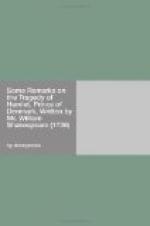Hamlet’s Behaviour to the King, &c. (Act fourth, p 320 and Sequel,) concerning Polonius’s Body, is too jocose and trivial.
Page 326. Enter Fortinbrass with an Army.
This is a Conduct in most of our Author’s Tragedies, and in many other of our Tragedy Writers, that is quite unnatural and absurd; I mean, introducing an Army on the Stage. Although our Imagination will bear a great Degree of Illusion, yet we can never so far impose on our Knowledge, and our Senses, as to imagine the Stage to contain an Army: Therefore in such a Case, the Recital of it, or seeing the Commander, and an Officer or Two of it, is the best Method of conducting such a Circumstance. Fortinbrass’s Troops are here brought in, I believe, to give Occasion for his appearing in the last Scene, and also to give Rise to Hamlet’s reflections thereon, (p. 327.) which tend to give some Reasons for his deferring the Punishment of the Usurper.
Laertes’s Character is a very odd one; it is not easy to say, whether it is good or bad; but his consenting to the villainous Contrivance of the Usurper’s to murder Hamlet, (p. 342.) makes him much more a bad Man than a good one. For surely Revenge for such an accidental Murder as was that of his Father’s (which from the Queen, it is to be supposed he was acquainted with all the Circumstances of) could never justify him in any treacherous Practices. It is a very nice Conduct in the Poet to make the Usurper build his Scheme upon the generous unsuspicious Temper of the Person he intends to murder, and thus to raise the Prince’s Character by the Confession of his Enemy, to make the Villain ten Times more odious from his own Mouth. The Contrivance of the Foil unbated (i.e. without a Button) is methinks too gross a Deceit to go down even with a Man of the most unsuspicious Nature.
The Scenes of Ophelia’s Madness are to me very shocking, in so noble a Piece as this. I am not against her having been represented mad; but surely, it might have been done with less Levity and more Decency. Mistakes are less tolerable from such a Genius as Shakespeare’s and especially in the very Pieces which give us such strong Proofs of his exalted Capacity. Mr. Warburton’s Note (in Mr. Theobalds) on Laertes’s Rebellion, is very judicious, (as indeed are all those of that Gentleman) only I cannot think Laertes (for the Reasons I have given) a good Character.




